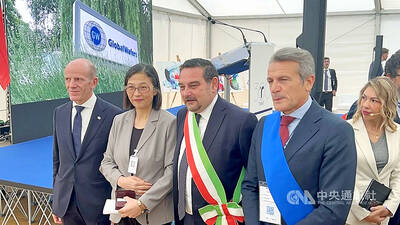Xiaomi Corp (小米), a fast-growing Chinese maker of cheap smartphones, took its first step in building an overseas network of e-commerce partners yesterday when it teamed up with Taiwan-based Web portal PChome Online Inc (網路家庭).
PChome will begin selling an initial allocation of 10,000 units of the enhanced version of Xiaomi’s Redmi Note (also known as Hongmi Note) budget handset later this month.
Consumers planning to buy the phone can register their interest on PChome through their PChome accounts from Friday to Thursday next week.

Photo: Lo Hsiu-wen, Taipei Times
Sales of the phone are to begin on Friday next week.
Xiaomi president Bin Lin (林斌) said his company intends to seek similar partnerships in other countries to accelerate its expansion into key overseas markets, such as Singapore, Malaysia, Indonesia, India, the Philippines, Thailand, Russia, Brazil and Mexico.
“Our cooperation with PChome will be a new attempt to create a better user experience by two major e-commerce platforms,” Lin told a press conference in Taipei, referring to his own company’s Internet platform and that of PChome.
“PChome has many e-commerce innovations and is worth learning from,” he added.
PChome Online chairman Jan Hung-tze (詹宏志) said selling the enhanced version of the Redmi Note would give PChome a chance to learn how to deal with a high volume of online transactions within a short period of time, including how to manage cash flow.
The enhanced version of the Redmi Note is equipped with a 5.5-inch touchscreen with a resolution of 1,280 x 720 pixels, a MediaTek MT6592 1.7GHz octa-core processor, 2GB of RAM, 8GB of internal memory, a 13-megapixel rear camera, a 5-megapixel front camera and a 3100mAh removable battery.
The 3G device will be priced at NT$4,999, lower than most other octa-core smartphones in the nation, including the InFocus M320 assembled by Taiwan’s Hon Hai Precision Industry Co (鴻海), a main supplier of Apple Inc.
Xiaomi also announced that it was reducing the price of its Mi3 smartphone from NT$9,999 to NT$7,199 for a contract-free 16GB model, which will be available on Xiaomi Taiwan’s Web site from today.
Meanwhile, the Chinese company said that it is preparing to release its first 4G-enabled handsets to cash in on the newly launched long-term evolution (LTE) networks in China and Taiwan.
"Our research and development on 4G phones is in full swing," Lin said. "We are hoping to launch 4G phones as soon as possible and will bring them to Taiwanese consumers to improve their Web browsing and user experience."
He declined to give a timetable for the launch.

RECYCLE: Taiwan would aid manufacturers in refining rare earths from discarded appliances, which would fit the nation’s circular economy goals, minister Kung said Taiwan would work with the US and Japan on a proposed cooperation initiative in response to Beijing’s newly announced rare earth export curbs, Minister of Economic Affairs Kung Ming-hsin (龔明鑫) said yesterday. China last week announced new restrictions requiring companies to obtain export licenses if their products contain more than 0.1 percent of Chinese-origin rare earths by value. US Secretary of the Treasury Scott Bessent on Wednesday responded by saying that Beijing was “unreliable” in its rare earths exports, adding that the US would “neither be commanded, nor controlled” by China, several media outlets reported. Japanese Minister of Finance Katsunobu Kato yesterday also

‘DRAMATIC AND POSITIVE’: AI growth would be better than it previously forecast and would stay robust even if the Chinese market became inaccessible for customers, it said Taiwan Semiconductor Manufacturing Co (TSMC, 台積電) yesterday raised its full-year revenue growth outlook after posting record profit for last quarter, despite growing market concern about an artificial intelligence (AI) bubble. The company said it expects revenue to expand about 35 percent year-on-year, driven mainly by faster-than-expected demand for leading-edge chips for AI applications. The world’s biggest contract chipmaker in July projected that revenue this year would expand about 30 percent in US dollar terms. The company also slightly hiked its capital expenditure for this year to US$40 billion to US$42 billion, compared with US$38 billion to US$42 billion it set previously. “AI demand actually

Jensen Huang (黃仁勳), founder and CEO of US-based artificial intelligence chip designer Nvidia Corp and Taiwan Semiconductor Manufacturing Co (TSMC, 台積電) on Friday celebrated the first Nvidia Blackwell wafer produced on US soil. Huang visited TSMC’s advanced wafer fab in the US state of Arizona and joined the Taiwanese chipmaker’s executives to witness the efforts to “build the infrastructure that powers the world’s AI factories, right here in America,” Nvidia said in a statement. At the event, Huang joined Y.L. Wang (王英郎), vice president of operations at TSMC, in signing their names on the Blackwell wafer to

Taiwan-based GlobalWafers Co., the world’s third largest silicon wafer supplier, on Wednesday opened a 12-inch silicon wafer plant in Novara, northern Italy - the country’s most advanced silicon wafer facility to date. The new plant, coded “Fab300,” was launched by GlobalWafers’ Italian subsidiary MEMC Electronics Materials S.p.A at a ceremony attended by Taiwan’s representative to Italy Vincent Tsai (蔡允中), MEMC President Marco Sciamanna and Novara Mayor Alessandro Canelli. GlobalWafers Chairwoman Doris Hsu (徐秀蘭) said the investment marked a milestone in the company’s expansion in Europe, adding that the Novara plant will be powered entirely by renewable energy - a reflection of its